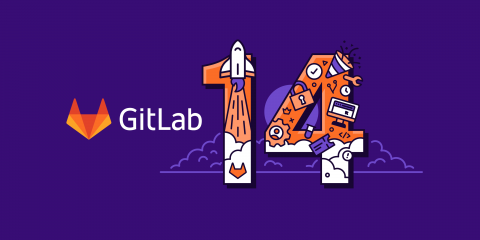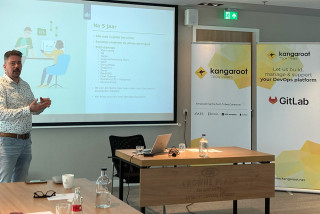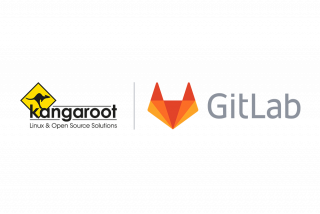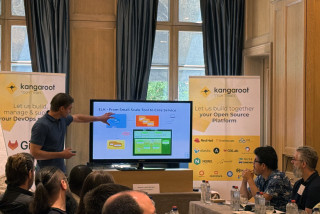GitLab 14 signals shift to modern DevOps: A DevOps platform with velocity, trust, and visibility
The DevOps era began with a big idea: dissolve silos to deliver better software, faster. In the transition from classic software paradigms, DIY DevOps toolchains were built with parts that were never designed to work together. That DIY DevOps era left many trapped in new silos, without visibility, and mired in maintenance. Business outcomes suffered as the potential of DevOps was never fully realised.
The next iteration of DevOps
There is a better way to build software. GitLab 14 delivers modern DevOps with a complete DevOps platform, for a streamlined experience that unleashes the power of DevOps. Over the past year, GitLab has shipped advanced DevOps platform capabilities that enable any team to build and deliver software with velocity, trust, and visibility – no matter their size, industry, or location.
With enhancements across the software development lifecycle, GitLab has placed strongly in several market reports across a broad range of areas from Enterprise Agile Planning and Application Security Testing to Continuous Delivery and Release Automation. Tying it all together with a platform approach is a keystone of the next shift in the DevOps movement. GitLab was named a representative vendor in a market overview of DevOps platforms.
As a “new normal” is taking shape after the pandemic, companies worldwide are coming to grips with what it means to work in hybrid and remote environments. A modern DevOps solution needs to meet the emerging demands for a more flexible workplace. GitLab has been a pioneer and champion of remote work for years and was recently mentioned by Fast Company as a world-changing idea. Having unlocked many of the secrets to remote work success, GitLab stepped up to help others out by shipping a Remote Work Playbook and a Coursera course on “How to Manage a Remote Team.” Our all-remote know-how and experience went into the development of GitLab 14 to build capabilities that work wherever you do.
Velocity with confidence
GitLab 14 enables you to increase development velocity and stay confident with a consistent and efficient developer and operator experience, yielding a more predictable DevOps lifecycle. By using one platform for source code management, continuous integration (CI), continuous delivery (CD), infrastructure as code, security, and beyond, teams are more efficient, collaborative, and productive. Our 2021 Global DevSecOps Survey shows engineers are happier when they can focus on innovation and adding value than when maintaining integrations – and happy developers attract and retain talent.
Organizations with a mature DevOps culture know the value of managing configuration as code, IT infrastructure as code, and more, with the same platform and best practices used for application development. In GitLab 14, our Pipeline Editor lowers the barrier to entry for CI/CD while also accelerating power users, with visual authoring and versioning, continuous validation, and pipeline visualization. GitLab 14’s Kubernetes Agent enables secure deployment to your cloud-native infrastructure. GitLab 14 also meets customers where they are by supporting GitOps with agent-based and agentless approaches and allows for deployments anywhere, regardless of whether infrastructure is cloud-native.
Visibility into DevOps success
The DevOps Research and Assessment (DORA) firm’s industry-defining research shows how focused improvement of software delivery performance leads to positive business outcomes like happier customers, greater market share, and increased revenue. Focusing efforts requires measuring four metrics in particular that are highly correlated with business performance. These are deployment frequency, lead time for changes, time to restore service, and change failure rate.
As a complete DevOps platform, GitLab 14 is uniquely capable of delivering visibility into DevOps with out of the box measurement and visualization of operational metrics, including DORA metrics, that have come to define DevOps maturity. With that visibility comes confidence in the ability to drive both team performance and competitive advantage.
GitLab 14 also takes the key next step toward actionability, with an array of customizable Value Stream Analytics to optimize workflows. Constituent analytics like mean time to merge can uncover bottlenecks such as dysfunction in code review, allowing management to identify the root causes of slowdowns in the DevOps lifecycle, and enabling IT leaders to align with business priorities.
Built-in security
Security without sacrifice – the promise of DevSecOps – is realized with built-in security for platform-driven alignment that decreases exposure, while keeping projects on-time and on-budget. In a world where security is everyone’s responsibility, automating processes and policies gives developers and security pros the information they need to meet this responsibility.
Enforcing security on every commit is a matter of course in GitLab 14’s CI/CD, providing real-time feedback as development is happening. A Semgrep analyzer for application security testing offers access to a global rule registry and customization for policy requirements. Acquisitions of Fuzzit and Peach Tech, and GitLab’s new proprietary browser-based DAST crawler, test modern APIs and Single Page Applications (SPAs) demonstrating innovation to meet requirements of modern DevOps. New vulnerability management capabilities increase visibility, providing the controls and observability needed to protect the software factory and its deliverables.
Everyone can contribute
GitLab 14 has been built by the company and the community together to advance global adoption of modern DevOps.
Thanks to GitLab’s open core model, more than 10,000 merge requests from the wider community have been merged into the product since January 2016. The wider community contributes alongside more than 1,300 GitLab team members, all working remotely from 68 countries. GitLab believes in a world where everyone can contribute.
Choose for Kangaroot to start your DevOps platform with GitLab





